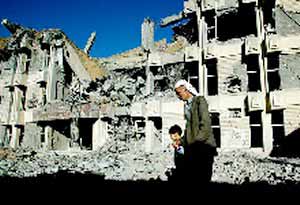U.S. officials have seen remnants of Republican Guard and other Iraqi army units join up with other stragglers in and around Tikrit, about 90 miles northwest of Baghdad. Vehicles and other military equipment remain. "You have elements, remnants of that that are coalescing and forming composite units," said Navy Lt. Mark Kitchens, a Central Command spokesman. However, after weeks of airstrikes and the collapse of the regime in Baghdad and other parts of the country, the units reforming in Tikrit are not believed to be an effective fighting force, Kitchens said. Tikrit has long been a power center for Iraq's Sunni Muslim tribes, who may plan to hold out for as long as possible out of fear of losing power to the nation's Shiite majority. The Iraqi president drew many members of his inner circle from Tikrit and built a number of fortified palaces and military installations there - many of which have been targeted in airstrikes. A few thousand Special Republican Guard troops are believed to remain in northern Iraq, including near Tikrit and Bayji, a town about 25 miles to the north. Gen. Richard Myers, chairman of the Joint Chiefs of Staff, said Friday that ground forces and special forces are "degrading regime forces in and near Tikrit." He told reporters at the Pentagon that there are "still enemy targets north of Baghdad, in Tikrit and some of the other major cities up there that we're going to have to deal with." Saddam's strongholds in the north have tumbled like dominoes; on Thursday, Kirkuk and its vast oil fields fell with barely a fight. In Mosul, Iraq's third-largest city, Iraqi forces seemed to vanish as soldiers dropped their arms and uniforms rather than fight U.S.-led forces. Chaos ruled Mosul's streets Friday, with banks ransacked and ambulances hijacked at gunpoint. The turmoil - just a day after a similar free-for-all in Kirkuk - was a potent reminder of the huge challenges ahead in postwar Iraq. Lt. Col. Robert Waltemeyer, commander of a U.S. Special Operations unit that helped secure Mosul, met with local tribal and clan leaders Friday and announced a 10 p.m. to 6 a.m. curfew. He said U.S. forces would not tolerate looting or reprisals. The city seemed dramatically calmer Saturday, as more U.S. troops arrived, and Kurdish fighters set up sandbag positions and checkpoints at main intersections, apparently in an attempt to clamp down on looting. Local residents also took measures against looters, barricading sidestreets with rocks and vehicles. A convoy of about 25 trucks and other military vehicles carrying U.S. troops rolled right to the heart of town Saturday, flying American flags. Thousands of residents lined the streets, waving and giving them the thumbs-up signs. Troops waved back, some taking snapshots. The Kurdish presence in Mosul and Kirkuk prompted Turkish leaders to review plans for beefing up Turkey's military presence in northern Iraq. Washington has promised to quickly take control of the Kirkuk area from Kurdish fighters. The Turkish government fears stronger and richer Iraqi Kurds could one day seek independence and encourage separatist Kurds in Turkey. Kurds consider Kirkuk a pillar of their ethnic homeland. They also feel strong bonds with parts of Mosul, where about a quarter of the population is Kurdish. The main feature of Mosul, however, is its role as a bastion of Arab culture in northern Iraq; distrust of the Kurdish militiamen could become a point of friction. To the west, U.S. troops seized control of crossings on two highways leading into Syria after the Iraqi colonel in charge of the checkpoints surrendered. They found tough resistance near Qaim, the main town on the Syrian border, though the fight was expected to end soon. Gen. Myers said some intelligence reports suggest "the leaders ... want to surrender." The unexpected stiff defense there raised speculation that the town may be site for weapons of mass destruction, Central Command said. Most Iraqi surface-to-surface missiles fired in the 1991 Gulf War were launched from the area. |
